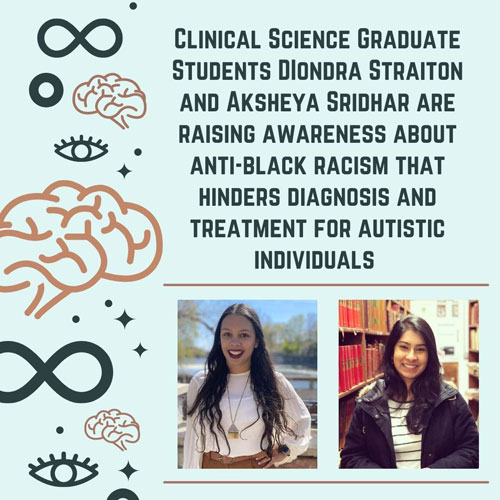Clinical Science graduate students Diondra Straiton and Aksheya Sridhar are addressing anti-Black racism that affects Autism diagnosis and treatment
October 12, 2021 - Caroline Kraft
 Diondra Straiton and Aksheya Sridhar, graduate students in Clinical Science, are raising awareness about anti-Black racism that affects the diagnosis and treatment of individuals with autism spectrum disorders. Straiton and Sridhar recently published a short-report illustrating the ways racism hinders paths to diagnosis and treatment for autistic individuals and their families and providing recommendations to reduce racism in clinical spaces.
Diondra Straiton and Aksheya Sridhar, graduate students in Clinical Science, are raising awareness about anti-Black racism that affects the diagnosis and treatment of individuals with autism spectrum disorders. Straiton and Sridhar recently published a short-report illustrating the ways racism hinders paths to diagnosis and treatment for autistic individuals and their families and providing recommendations to reduce racism in clinical spaces.
“Our goal with this paper was to highlight the responsibility practitioners have in preventing and addressing anti-Black racism in our work with autistic clients, and to provide some concrete, actionable steps that folks could take,” Straiton and Sridhar said.
Earlier treatment is associated with better developmental outcomes for autistic individuals, but treatment is not available until individuals have a diagnosis. Early diagnosis is key for children with autism spectrum disorders to begin receiving the services they need, but Black autistic children are 2.6 times more likely than White autistic children to be misdiagnosed. Families of Black autistic children report three times more visits to healthcare providers in order to receive a diagnosis than families of White autistic children, even though Black and White autistic children present similar behaviors during assessments. Once children receive a diagnosis, families also experience disparities in access to treatment. Black and Latinx families are less likely to access specialty care for their children’s specific needs and experience more delays in receiving treatment than White families of autistic children. Lower-income families are particularly likely to experience marginalization and disparities in services and treatment. Additionally, Black families are more likely to report having low quality autism-related care, and they attribute this to health care providers being dismissive of parent concerns and lacking cultural knowledge and humility.
Straiton and Sridhar posited the following suggestions for individuals committed to reducing racism in clinical settings: amplifying Black autistic voices in their organization, acknowledging ways their organization perpetuates racism, being aware that cultural humility is a continuous learning process, realizing that Black families have particularly complex pathways to navigate in order to receive services, and advocating for systems-level changes in policies and procedures.
Straiton and Sridhar also developed a webpage (https://autismlab.psy.msu.edu/resources/anti-racism-resources/)with resources for individuals and organizations who want to advocate for systemic change in addressing anti-Black racism in clinical settings.
“There are so many resources that have already been developed, so we wanted to create a website that could serve as a starting point for folks doing this work. We hope to grow the resource list on the website over time and encourage anyone to share resources they recommend!”
You can find their original published article here: https://journals.sagepub.com/doi/full/10.1177/136236132110436434

